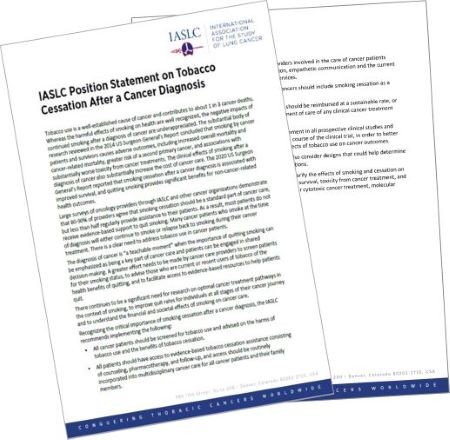
Contact: Chris Martin, cmartin@davidjamesgroup.com 630.670.2745
Tobacco use is a well-established cause of cancer and contributes to about 1 in 3 cancer deaths. Whereas the harmful effects of smoking on health are well recognized, the negative impacts of continued smoking after a diagnosis of cancer are under appreciated. The substantial body of research reviewed in the 2014 US Surgeon General’s Report concluded that smoking by cancer patients and survivors causes adverse outcomes, including increased overall mortality and cancer-related mortality, greater risk of a second primary cancer, and associations with substantially worse toxicity from cancer treatments. The clinical effects of smoking after a diagnosis of cancer also substantially increase the cost of cancer care. The 2020 US Surgeon General’s Report reported that smoking cessation after a cancer diagnosis is associated with improved survival, and quitting smoking provides significant benefits for non-cancer-related health outcomes.
Large surveys of oncology providers through IASLC and other cancer organizations demonstrate that 80-90% of providers agree that smoking cessation should be a standard part of cancer care, but less than half regularly provide assistance to their patients. As a result, most patients do not receive evidence-based support to quit smoking. Many cancer patients who smoke at the time of diagnosis will either continue to smoke or relapse back to smoking during their cancer treatment. There is a clear need to address tobacco use in cancer patients.
The diagnosis of cancer is “a teachable moment” when the importance of quitting smoking can be emphasized as being a key part of cancer care and patients can be engaged in shared decision-making. A greater effort needs to be made by cancer care providers to screen patients for their smoking status, to advise those who are current or recent users of tobacco of the health benefits of quitting, and to facilitate access to evidence-based resources to help patients quit.
There continues to be a significant need for research on optimal cancer treatment pathways in the context of smoking, to improve quit rates for individuals at all stages of their cancer journey and to understand the financial and societal effects of smoking on cancer care.
Recognizing the critical importance of smoking cessation after a cancer diagnosis, the IASLC recommends implementing the following:
- All cancer patients should be screened for tobacco use and advised on the harms of tobacco use and the benefits of tobacco cessation.
- All patients should have access to evidence-based tobacco cessation assistance consisting of counseling, pharmacotherapy, and follow-up, and access should be routinely incorporated into multidisciplinary cancer care for all cancer patients and their family members.
- Educational programs for health care providers involved in the care of cancer patients should include training on tobacco cessation, empathetic communication and the current best, evidence-based tobacco cessation services.
- Practice guidelines and care paths for all cancers should include smoking cessation as a component of quality cancer care.
- Evidence-based smoking cessation support should be reimbursed at a sustainable rate, or comprehensively provided as a core component of care of any clinical cancer treatment service.
- Smoking status should be a required data element in all prospective clinical studies and captured at patient registration and over the course of the clinical trial, in order to better understand the prognostic and predictive effects of tobacco use on cancer outcomes.
- Clinical trials of patients with cancer should also consider designs that could help determine the most effective tobacco cessation interventions.
Preclinical and clinical research is needed to clarify the effects of smoking and cessation on cancer biology, overall survival, cancer-related survival, toxicity from cancer treatment, and potential confounding or effect modification for cytotoxic cancer treatment, molecular therapeutics, and immunotherapy.
###
About the IASLC:
The International Association for the Study of Lung Cancer (IASLC) is the only global organization dedicated solely to the study of lung cancer and other thoracic malignancies. Founded in 1974, the association's membership includes more than 7,500 lung cancer specialists across all disciplines in over 100 countries, forming a global network working together to conquer lung and thoracic cancers worldwide. The association also publishes the Journal of Thoracic Oncology, the primary educational and informational publication for topics relevant to the prevention, detection, diagnosis, and treatment of all thoracic malignancies. Visit www.iaslc.org for more information.
